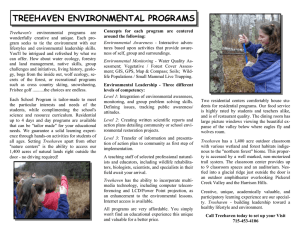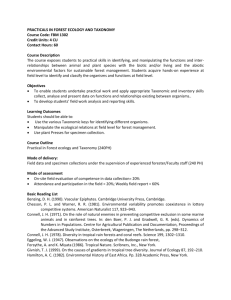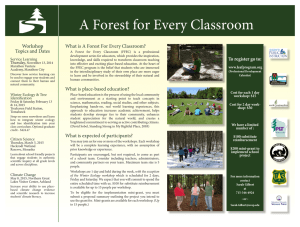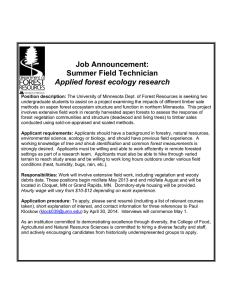Our Graduate Program School of Environmental and Forest Sciences
advertisement
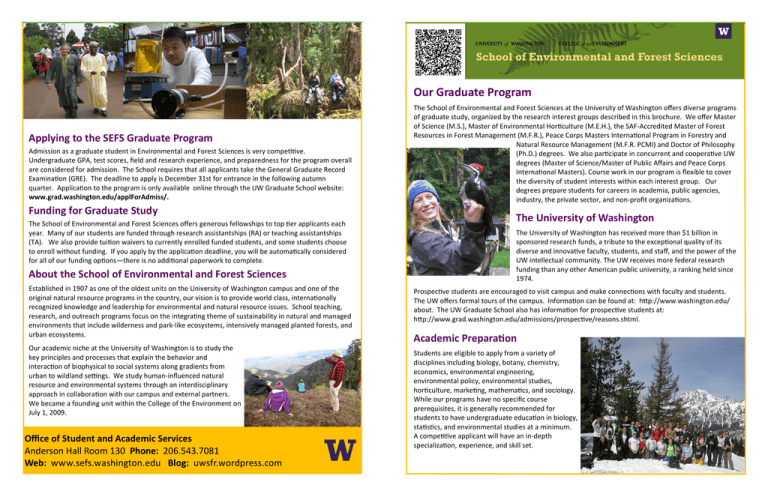
UNIVERSITY WASHINGTON COLLEGE ENVIRONMENT School of Environmental and Forest Sciences Our Graduate Program Applying to the SEFS Graduate Program Admission as a graduate student in Environmental and Forest Sciences is very competitive. Undergraduate GPA, test scores, field and research experience, and preparedness for the program overall are considered for admission. The School requires that all applicants take the General Graduate Record Examination (GRE). The deadline to apply is December 31st for entrance in the following autumn quarter. Application to the program is only available online through the UW Graduate School website: www.grad.washington.edu/applForAdmiss/. Funding for Graduate Study The School of Environmental and Forest Sciences offers generous fellowships to top tier applicants each year. Many of our students are funded through research assistantships (RA) or teaching assistantships (TA). We also provide tuition waivers to currently enrolled funded students, and some students choose to enroll without funding. If you apply by the application deadline, you will be automatically considered for all of our funding options—there is no additional paperwork to complete. About the School of Environmental and Forest Sciences Established in 1907 as one of the oldest units on the University of Washington campus and one of the original natural resource programs in the country, our vision is to provide world class, internationally recognized knowledge and leadership for environmental and natural resource issues. School teaching, research, and outreach programs focus on the integrating theme of sustainability in natural and managed environments that include wilderness and park-like ecosystems, intensively managed planted forests, and urban ecosystems. Our academic niche at the University of Washington is to study the key principles and processes that explain the behavior and interaction of biophysical to social systems along gradients from urban to wildland settings. We study human-influenced natural resource and environmental systems through an interdisciplinary approach in collaboration with our campus and external partners. We became a founding unit within the College of the Environment on July 1, 2009. Office of Student and Academic Services Anderson Hall Room 130 Phone: 206.543.7081 Web: www.sefs.washington.edu Blog: uwsfr.wordpress.com The School of Environmental and Forest Sciences at the University of Washington offers diverse programs of graduate study, organized by the research interest groups described in this brochure. We offer Master of Science (M.S.), Master of Environmental Horticulture (M.E.H.), the SAF-Accredited Master of Forest Resources in Forest Management (M.F.R.), Peace Corps Masters International Program in Forestry and Natural Resource Management (M.F.R. PCMI) and Doctor of Philosophy (Ph.D.) degrees. We also participate in concurrent and cooperative UW degrees (Master of Science/Master of Public Affairs and Peace Corps International Masters). Course work in our program is flexible to cover the diversity of student interests within each interest group. Our degrees prepare students for careers in academia, public agencies, industry, the private sector, and non-profit organizations. The University of Washington The University of Washington has received more than $1 billion in sponsored research funds, a tribute to the exceptional quality of its diverse and innovative faculty, students, and staff, and the power of the UW intellectual community. The UW receives more federal research funding than any other American public university, a ranking held since 1974. Prospective students are encouraged to visit campus and make connections with faculty and students. The UW offers formal tours of the campus. Information can be found at: http://www.washington.edu/ about. The UW Graduate School also has information for prospective students at: http://www.grad.washington.edu/admissions/prospective/reasons.shtml. Academic Preparation Students are eligible to apply from a variety of disciplines including biology, botany, chemistry, economics, environmental engineering, environmental policy, environmental studies, horticulture, marketing, mathematics, and sociology. While our programs have no specific course prerequisites, it is generally recommended for students to have undergraduate education in biology, statistics, and environmental studies at a minimum. A competitive applicant will have an in-depth specialization, experience, and skill set. SEFS Graduate Research Interest Groups Teaching & Research Faculty Bioresource Science and Engineering (MS, PhD) Research focuses on conversion of cellulosic GRAHAM ALLAN CREATIVITY & INNOVATION ERNESTO ALVARADO WILDFIRES/ECOLOGY; SUSTAINABLE RESOURCES STANLEY ASAH HUMAN DIMENSIONS OF NATURAL RESOURCE MGMT JONATHAN BAKKER ECOSYSTEM RESTORATION & MANAGEMENT SUSAN BOLTON HYDROLOGY & WATERSHED MGMT SALLY BROWN GREEN INFRASTRUCTURE; URBAN RESIDUALS RENATA BURA NATURAL PRODUCTS CHEMISTRY DAVID BUTMAN FOREST ECOLOGY; TERRESTRIAL/AQUATIC SYSTEMS THOMAS DELUCA FOREST SOILS; FOREST ECOLOGY SHARON DOTY PLANT MICROBIOLOGY; FOREST ECOLOGY IVAN EASTIN FOREST PRODUCTS MARKETING GREGORY ETTL SUSTAINABLE FORESTRY KERN EWING RESTORATION & WETLAND ECOLOGY JERRY FRANKLIN FOREST ECOLOGY; SUSTAINABLE RESOURCE MGMT JAMES FRIDLEY FOREST ENGINEERING; RESTORATION ECOLOGY INDRONEIL GANGULY SUSTAINABLE RESOURCE MANAGEMENT RICHARD GUSTAFSON BIORESOURCE SCIENCE/FIBER & POLYMER SCIENCE CHARLES HALPERN FOREST ECOLOGY ROBERT HARRISON FOREST SOIL; CARBON SQUESTRATION; FERTILITY PETER KAHN SOCIAL SCIENCES SOO-HYUNG KIM PLANT ECOPHYSIOLOGY; PLANT GROWTH MODELING and natural resources. Natural resource planning, policy, business, economics, and applied management issues provide the context for social science research. Students are expected to identify and develop an understanding of relevant social science disciplines such as sociology, planning, political science, law, economics, business, and anthropology. Study areas may include community forestry and rural development, land use planning, natural resource policy and law, public administration and decision making, social, business, and economic impact assessment, environmental externalities, and recreation management. JOSHUA LAWLER CONSERVATION BIOLOGY/LANDSCAPE ECOLOGY JOHN MARZLUFF WILDLIFE BIOLOGY L. MONIKA MOSKAL REMOTE SENSING & BIOSPATIAL ANALYSIS DOROTHY PAUN SUSTAINABILITY PERFORMANCE ASSESSMENT JOHN PEREZ-GARCIA FOREST ECONOMICS; SOCIAL SCIENCES Sustainable Resource Management (MFR, PCMI, MS, PhD) Students develop an integrated set of SERGEY RABOTYAGOV NATURAL RESOURCE ECONOMICS SARAH REICHARD URBAN CONSERVATION BIOLOGY FERNANDO RESENDE BIOMASS, RENEWABLE ENERGY CLARE RYAN NATURAL RESOURCES POLICY & ADMININISTRATION PATRICK TOBIN DISTURBANCE ECOLOGY; FOREST ENTOMOLOGY CHRISTIAN TORGERSEN LANDSCAPE ECOLOGY SANDOR TOTH NATURAL RESOURCE INFORMATICS ERIC TURNBLOM FOREST BIOMETRICS; SUSTAINABLE RESOURCE MGMT DAN VOGT SOIL & ECOSYSTEM ECOLOGY KRISTIINA VOGT ECOSYSTEM MANAGEMENT; FOREST ECOLOGY AARON WIRSING WILDLIFE SCIENCE DARLENE ZABOWSKI FOREST SOILS; RESTORATION ECOLOGY biomass to fuels, chemicals, and high value products, including process development and simulation, natural products chemistry, bioconversion methods, and techno-economic analysis. Faculty in the interest group work closely with faculty from Chemical Engineering, Chemistry, and Mechanical Engineering to investigate the fundamentals of biomass conversion and to develop new processes for making fuels, chemicals, and bio-based products that are economically viable and environmentally beneficial. The interest group is highly interdisciplinary and students with backgrounds in chemistry, biology, and engineering are encouraged to apply. Forest Ecology (MS, PhD) Students are involved in basic and applied research in a diversity of fields including aquatic-terrestrial interactions, conservation biology, ecological modeling, ecophysiology, ecosystem studies, entomology, fire ecology, forest community ecology, genetics, global climate change, landscape ecology, paleoecology, pathology, and soils and nutrient cycling. No student covers the entire range of interests within the interest group, but all students benefit from the diversity of interests and perspectives represented by faculty associated with the group. Forest Soils (MS, PhD) Forest Soils is a flexible program covering many aspects of soil science. Students are involved in research relating soils to ecosystem processes, forest resources, restoration, carbon sequestration, and waste application. Some examples of current research areas include soil carbon sequestration, nitrogen deposition effects on soils, residual applications, and N-fixation of forest soils. Students develop expertise in one or more fields of soil science including management of forest soils, soil development, soil chemistry, soil microbiology, and biogeochemical cycling. Restoration Ecology and Environmental Horticulture (MEH, MS, PhD) Students investigate plants and soils and their importance in the restoration and sustainable management of ecosystems. Two learned degrees, Master of Science (MS) and Doctor of Philosophy (PhD), and a professional degree, Master of Environmental Horticulture (MEH), are tailored to the interests and needs of individual students. Restoration Ecology refers to intentional activities that initiate or accelerate the recovery of ecosystems with respect to their health, integrity, and sustainability. Frequently, the ecosystem that requires restoration has been degraded, damaged, transformed, or entirely destroyed as the direct or indirect result of human activities. In some cases, these impacts have been caused or aggravated by natural agencies such as wildfire, floods, storms, or volcanic eruption. Social Sciences (MS, PhD) Research is centered around the social science aspects of the environment skills concentrating on silvicultural principles and practices, business management, forest economics, forest biometrics, remote sensing, and operations research. Students draw upon the expertise of a diverse faculty and are encouraged to expand the interdisciplinary nature of their program by enrolling in courses in related UW departments and programs, including the Department of Economics, Dan Evans Graduate School of Public Affairs, School of Law and the Jackson School of International Studies. Cooperating programs also include the School’s Center for International Trade in Forest Products, as well as other UW programs such as Biostatistics, Statistics, Applied Mathematics, and the Center for Quantitative Science. Wildlife Science (MS, PhD) The professional field of wildlife science covers the basic ecology of free- living animals and their relations to humans, including their management and conservation. Wildlife science is therefore a multi-disciplinary field which draws from the natural, quantitative, and social sciences. The Wildlife Science interest group is active in all phases of the discipline with current research projects on the basic ecology of species and a wide range of issues dealing with management and conservation of species and ecosystems, including problems in forest management, predator-prey interactions, urban ecology, and the human dimensions of conservation. The interest group focuses on vertebrates and is strongly field-oriented. Courses and seminars feature current approaches to wildlife research and management, ecological theory, and quantitative methods. The interest group stresses training in research, and opportunities for research are extensive.
